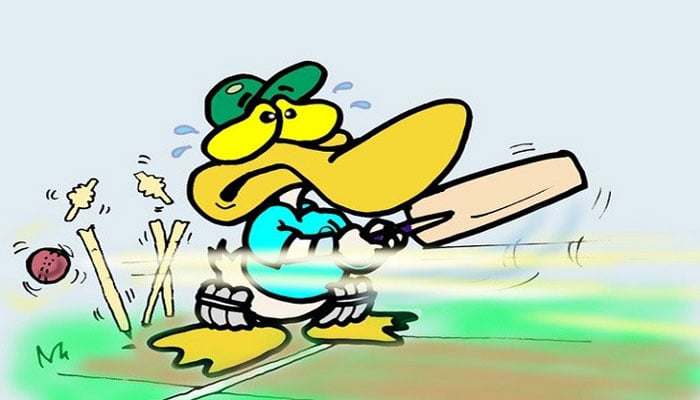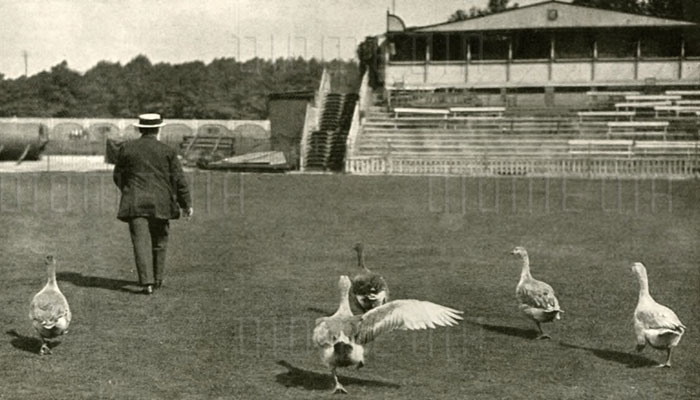How ‘duck’ comes in cricket field
Originally, it was not ‘duck’ but ‘duck’s egg’, which was being used long before Test cricket began. It has an interesting background story
Duck is a bird but it is used as a term in the game of cricket. When a batsman gets out without scoring a run, it is said that he’s out for a duck.
Originally, it was not ‘duck’ but ‘duck’s egg’, which was being used long before Test cricket began. It has an interesting background story: the Prince of Wales, who later became King Edward VII, was dismissed for nought on July 17, 1866. Then a ‘Daily Times’ correspondent recording the incident, wrote that the Prince “retired to the royal pavilion on a ‘duck’s egg’.” Thus, the duck became a batsman’s nightmare.
It is also said that the name has come from the shape of the number “0”, which resembles duck’s egg and hence scoring a ‘0’ (zero) is called a ‘duck’.
There are various names for ‘0’ (zero) in English and related concepts. The names for the number 0 include ‘zero’, ‘cipher’, ‘null’, ‘naught’, ‘nought’, ‘love’, ‘duck’, ‘nil’, ‘nada’, ‘zilch’, ‘zip’, ‘aught’, and ‘ought’ as the letter ‘o’ is often spelled as ‘oh’.
However, ‘duck’ is now very commonly used as a term for being dismissed without scoring a run. There is a variety being used to describe specific types of duck, such as ‘golden duck’, ‘diamond duck’, ‘silver duck’, ‘bronze duck’, ‘royal duck’, ‘titanium duck’, and also ‘laughing duck’.
If a player is dismissed off the first ball he faces, it is said that he has been dismissed for a ‘golden duck’.
When a batsman gets out for a duck on the second ball that he faces, it is called a ‘silver duck’ and if the batsman is dismissed for zero on the third ball of his innings, it is called a ‘bronze duck’.
When a batsman gets out without facing a single ball, it is called a ‘diamond duck’. Usually, it is a run-out of a new batsman at the non-striker’s end, or stumped off a wide ball is also said to be out for a ‘diamond duck’.
The ‘royal duck’ is reserved for the openers. In this case, the batsman falls on the first delivery, which is also the first ball of the innings.
Also, the rare dismissal of ‘timed out’, in which the batsman takes too long to turn up at the crease, is also called a ‘diamond duck.
The batsman who departs for a duck, thereby ending the team’s innings is said to have earned a ‘laughing duck’.
When a batsman is dismissed for nought in both innings of a match, it is called a ‘pair’, because the two noughts together are thought to resemble a pair of spectacles.
If a batsman is dismissed first ball in both innings (two golden ducks in the same match), it is called a ‘king pair’.
During India's 1999-2000 tour of Australia, Ajit Agarkar of India was dismissed for a record seven consecutive ducks (four of them first ball), which earned him the nickname of ‘Bombay Duck’.
The first ever duck in a Test match was made in the very first Test, played between Australia and England at Melbourne in March 1877, when Ned Gregory of Australia was caught by Andrew Greenwood off the bowling of James Lillywhite.
The first player to be out for a duck in One-day International cricket was Australia’s Graeme Watson - bowled by Geoff Arnold of England, in the second ODI of the history, at Manchester on August 24, 1972.
The first duck in Twenty20 International cricket was seen in the first-ever T20I played between New Zealand and Australia at Auckland on February 17, 2005 when Mathew Sinclair of New Zealand was dismissed, caught by Simon Katich off Michael Kasprowicz.
Innumerable incidents of players getting out for a duck happened in all formats of cricket. Most of the players got out for nought several times but there were a few batsmen who never got a duck in their career.
The record for the most ducks in Test cricket is held by West Indies fast bowler Courtney Walsh, who was dismissed for nought on 43 occasions, while the record in overall first-class cricket is 156, set by a Worcestershire and England cricketer Reg Perks.
Sri Lanka’s batsman Sanath Jayasuriya holds the record for the most ducks in One-day International cricket. He was dismissed for nought on 34 occasions while the record for the most ducks in Twenty20 Internationals is held by Sri Lanka’s wicketkeeper-batsman Tillakaratne Dilshan, who got 10 ducks.
However, the overall (combined Test, ODI and T20I) record for the most ducks is 59, set by Sri Lanka’s Muttiah Muralitharan in 495 matches (328 innings).
-
Alex de Minaur faces surprise elimination in Acapulco thriller by Patrick Kypson
-
Devin Vassell, Wembanyama shine in Spurs victory over Detroit
-
USA beats Canada for first Olympic hockey gold in 46 years; Donald Trump, Barack Obama & others hail historic victory
-
Claressa Shields defeats Franchon Crews-Dezurn in heavyweight title rematch
-
Kara Braxton, WNBA All-Star and champion, dies at 43
-
Magic vs Clippers: Clippers announce Kawhi Leonard status after exit
-
NFL star Rondale Moore dies aged 25, Minnesota Vikings pay tribute
-
Winter Olympics 2026: Remembering the most unforgettable, heartwarming stories













